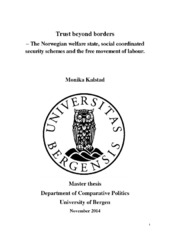| dc.description.abstract | Will the increase in the number of labour immigrants after the EU enlargements in 2004, 2007 and 2013, in the context of having to comply with the regulation of coordinated social security from EU, harm levels of general trust in Norway? If so can a decline in the levels of general trust come to challenge the legitimacy of the Scandinavian welfare state? The European community has always emphasized the importance of the four principles of free movement to the success and prosperity of its internal market; one of these four is the free movement of people in order to successfully implement the principle of free movement of people and enhance mobility and flexibility in the internal labour market; the coordinated social security rights were introduced. These ensures that when citizens from the internal market in the European economic area (EEA) takes on employment in another EEA country; they are treated equally along the lines of full citizens under the domestic social security(NOU, 2011 p. 113-115). In 2004, 2007 and 2013 European Union (EU) membership was extended to 11 new countries from Central and Eastern Europe. Their lower levels of economic development compared to most of the current countries in the EEA at that time caused concern in the public and among scholars, regarding how the enlargement would affect the internal market. Due to the gap in wage levels and the welfare program provided by the state in the eastern and the western EEA countries, one of these concerns was that the western countries would be in danger of becoming magnets" to labour immigration from the east(Kvist, 2004). With the coordinated social security rights in the EU, the role of the modern citizenship as guardian of the social citizenship and a tool for solidarity-building is obviously weakened. In Scandinavia the support of the welfare state has historically been even stronger and remained even more stable than anywhere else in Europe (Esping-Andersen, 1990). Simultaneously Scandinavian states are known for having exceptional high levels of general trust in their society compared to the rest of the world(NOU, 2011 p. 47). After the EU enlargement in 2004 and onwards, Norway experienced a strong increase in the number of labour immigrants from the EU. Currently labour immigrants from Eastern European EU countries have become the largest group of labour immigrants in Norway(Ministry, 2010-2011 p. 19). Speculations on how this would affect the legitimacy of the Norwegian welfare state, and what welfare benefits would be most attractive to these labour immigrants surfaced. | en_US |
